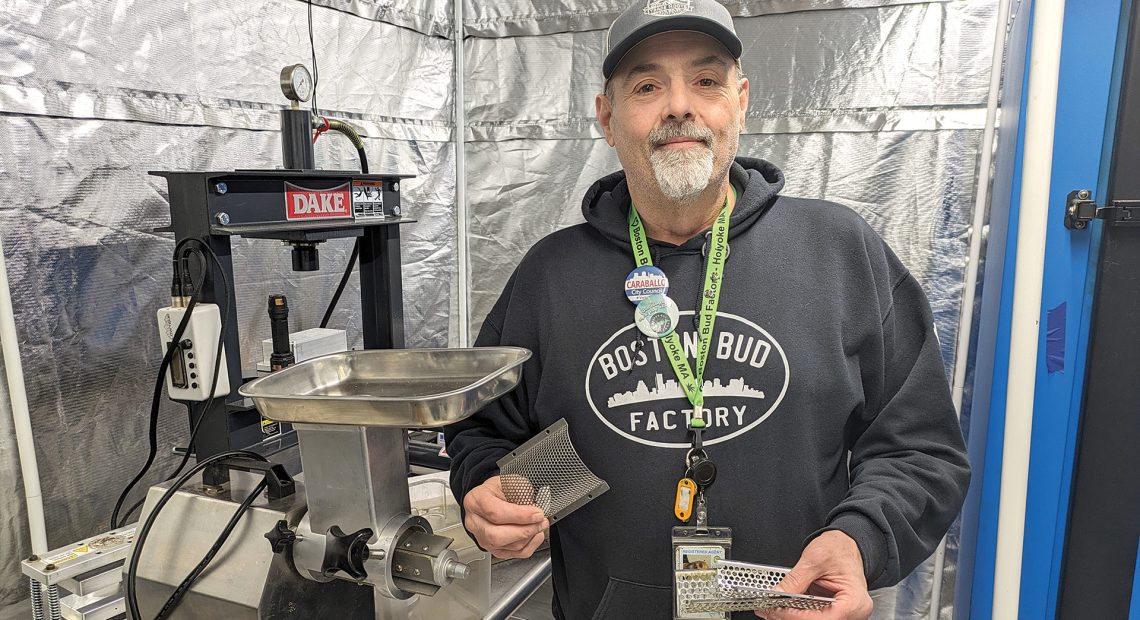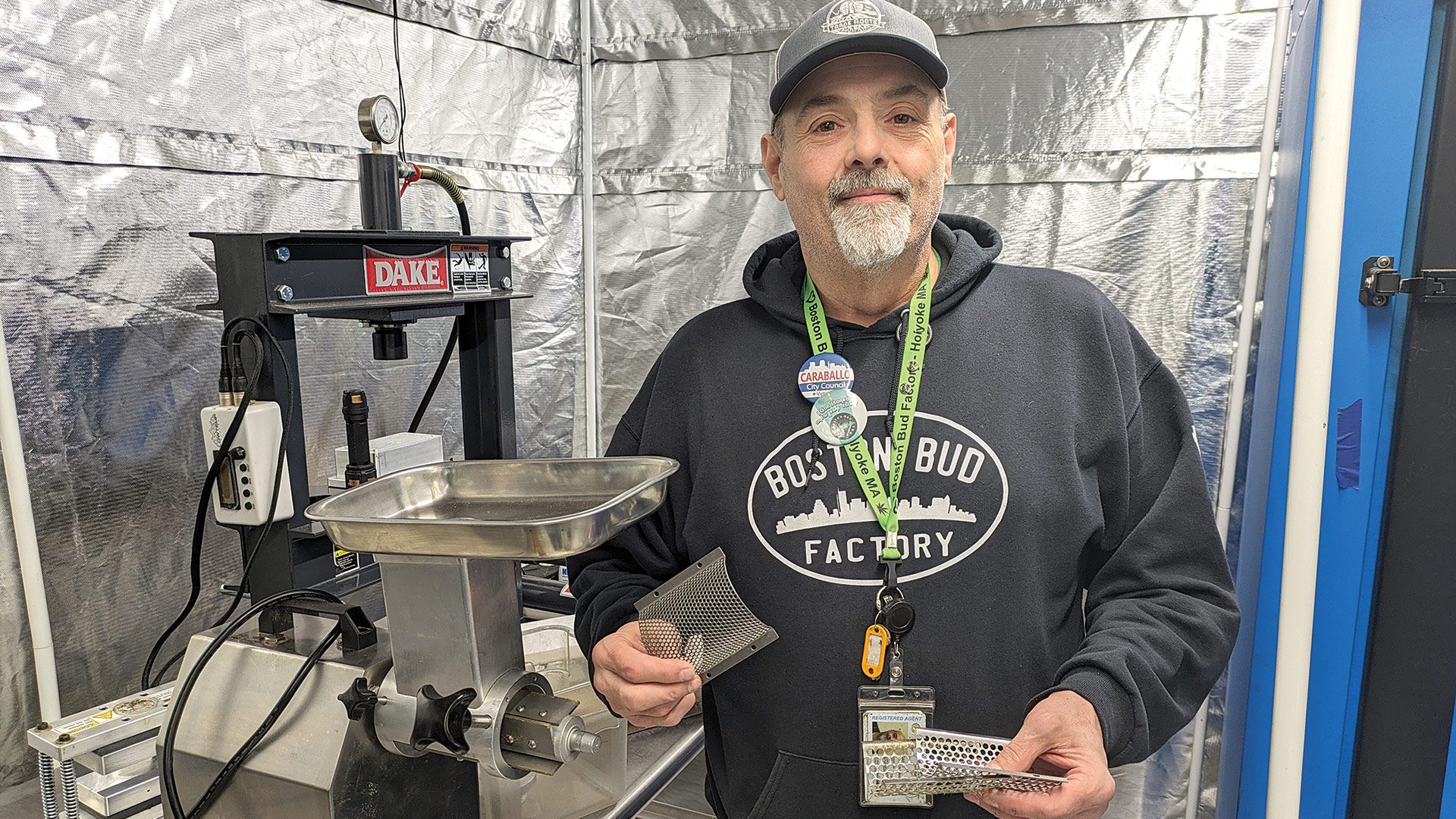
Cannabis-grinding Study Could Lead to Safer Workplaces
Breathing Easier

Frank Dailey shows off some equipment used to grind cannabis.
From his background in plant management and chemical engineering, Frank Dailey said, he understands the risks involved in manufacturing anything, let alone a product with so little research available in the realm of workplace safety.
So, when asked to take part in a National Institute of Occupational Safety & Health (NIOSH) evaluation of the cannabis grinding process at Boston Bud Factory, the Holyoke business Dailey owns, he was enthusiastic about it.
The study was first slated to take place at Trulieve in Holyoke, where an employee died in January 2022. The 27-year-old production technician suffered a fatal asthma attack while working at the indoor cannabis cultivation and processing facility. According to the Massachusetts Department of Public Health (DPH), the death occurred seven months after she started employment at the facility and three months after she began working as a flower technician, which involved processing and handling whole and ground cannabis flower buds.
Boston Bud Factory was contacted by Danny Stair, a local industry advocate and former Trulieve employee, who was concerned the study was in jeopardy following Trulieve’s departure from the Massachusetts market last year. So Dailey contacted NIOSH directly and volunteered his operations for the study.
“We put up signs when we’re grinding; we notify everybody. It can be a hazardous process. It doesn’t have to be, but it can be,” Dailey told BusinessWest. “We have to take into account allergens. Employees have allergic reactions processing some strains. It’s random; there’s no rhyme or reason.”
While he doesn’t know exactly what precautions were taken at Trulieve, “what I do know is that it’s common in the industry for large corporations to short personal protective equipment when the money’s tight. They need to pay for inventory. We’re answering to the money train in this industry, and it seems like it’s a common thing throughout the industry, that employees’ safety is not being looked out for.”
Dailey said Boston Bud Factory has already implemented strict PPE procedures when grinding cannabis due to possible employee reactions to dust, but still has concerns about whether the PPE was adequate, and he wants to be part of developing a wider body of knowledge that may become the basis for mandated workplace health regulations.
“People are talking about tax revenues and other issues in cannabis, but you don’t hear people talking about the effort the industry is making to keep their workers safe. Workers shouldn’t have to unionize and take extreme measures to implement safety in the workplace.”
“We know how dangerous dust is in other industries. Dust in foundries has caused explosions. Dust in factories has caused fires. As for cannabis dust, this is just the beginning of the employee exposure. As the industry grows, more and more dust is created.”
One of his employees with specific sensitivity concerns actually wears not only a Tyvek suit with a particulate mask, but also gloves duct-taped to the sleeves so the dust doesn’t get up the sleeves.
“These are techniques from the pharmaceutical industry that are easy to implement if someone is paying attention and has proper safety protocols in place,” he explained. “People are talking about tax revenues and other issues in cannabis, but you don’t hear people talking about the effort the industry is making to keep their workers safe. Workers shouldn’t have to unionize and take extreme measures to implement safety in the workplace.”
During the on-site visit, NIOSH will set up airborne particulate monitoring during the grinding process to see what the exposure is and how many airborne particulates employees are subject to.
“We use dust masks, basically particulate masks, and that should be enough in most cases. We’re not talking chemical fumes; it’s simply airborne particulates,” Dailey said. “But we need to know whether we need to go to N95 or a higher level to make sure enough particulates are captured.”
Historically, he added, a lot of cannabis manufacturing has been done underground, where employee safety isn’t paramount.
“We’re one of the smallest operations in Massachusetts; we’re fighting for survival,” he added. “But we need to do something to set some standards in this emerging industry.”
Statewide Investigation
Also in the wake of the death at Trulieve, the Massachusetts Department of Public Health (DPH) recently released an investigative report outlining additional steps the cannabis industry should take to prevent work-related asthma and sent a bulletin to healthcare providers in the Commonwealth urging vigilance in identifying work-related asthma among workers in that industry. The bulletin reminds providers that they are mandated to report cases of work-related asthma and other respiratory diseases to DPH.
While the Holyoke death is the only known asthma death in the U.S. cannabis industry, other cases of non-fatal respiratory disease among Massachusetts cannabis workers have been reported. According to DPH, cannabis-industry workers can be routinely exposed to numerous occupational respiratory hazards, including cannabis dust, mold, volatile organic compounds, pollen, bacterial endotoxins, pesticides, soil components, and cleaning disinfectants, which can cause and/or exacerbate chronic diseases, like asthma, if not addressed.
Massachusetts has more than 500 licensed cannabis industry employers providing jobs to more than 22,000 workers.
“The legalized cannabis industry in Massachusetts is relatively new, and the impact on the health and safety of workers demands our careful attention,” Public Health Commissioner Dr. Robert Goldstein noted in a statement. “As this workforce continues to expand, it will require all of us working together — state and federal agencies, regulators, healthcare providers, and the cannabis industry — to improve working conditions for these employees. At DPH, we will continue to identify and follow up on these cases using our long-standing public-health surveillance system for work-related respiratory disease and continue to work with our partners on documenting cases, building evidence around workplace hazards, and on intervention and policy.”
“The legalized cannabis industry in Massachusetts is relatively new, and the impact on the health and safety of workers demands our careful attention.”
According to DPH, work-related asthma is underrecognized in part because symptoms and industry and occupation data are not routinely collected. Yet, about 17% of new-onset adult asthma cases are related to workplace exposures. In Massachusetts, an estimated 200,000 adults have work-related asthma, according to data from DPH’s Occupational Health Surveillance Program.
In its bulletin, DPH urged healthcare providers to:
• Ask patients with new or worsening respiratory or allergic symptoms what they do for work and how it affects their health;
• Perform diagnostic testing, such as allergy testing, pulmonary imaging, and/or spirometry;
• Recommend workplace changes to avoid further exposure; and
• Report cases of work-related asthma and other work-related respiratory diseases to DPH, as required by law.
To improve worker safety, the investigative report recommended that employers:
• Assess and control hazardous materials in the workplace, including asthmagens;
• Ensure that all workers are properly trained about hazardous materials in the workplace;
• Develop and implement a comprehensive safety and health program that addresses hazard recognition, avoidance of unsafe conditions, and proper use of equipment; and
• Implement a medical surveillance program to monitor the health of their workers.
The report also noted that equipment manufacturers should adopt and implement the concept of ‘prevention through design’ to identify potential hazards associated with equipment and then eliminate these hazards through design changes; and that industry licensing agencies in Massachusetts should consider how they can further support the health and safety of cannabis-industry workers.
“Levels of exposure to cannabis dust at work are much higher than what is present during recreational use,” said Emily Sparer-Fine, director of DPH’s Occupational Health Surveillance Program. “Work processes that include grinding and concentrating an allergen need to be better controlled. It is critical for employers to assess and control exposure to hazardous materials, including the respiratory hazards found in the cannabis-processing facilities, such as cannabis dust.”
The Effort Continues
All this is gratifying to Dailey, who thanked Stair for ensuring that the NIOSH Study was completed, advocating for the safety cannabis-industry employees, and helping prevent future injuries or deaths. Dailey claimed that larger cannabis companies are prioritizing profits and growth over workplace safety, so it is important that advocates and smaller companies step up to take the lead in setting industry standards to ensure workplace safety.
“We are proud to be one of the first companies to prioritize worker safety over profits. Boston Bud Factory has said from the start that we didn’t want to be one of the big guys, and we still stand by that wholeheartedly,” he added. “We hope that the NIOSH safety evaluation will help determine industry standards that could help to ensure worker safety in this emerging and rapidly growing industry. Worker safety should always take precedence over profits, no matter how large the company is.”





